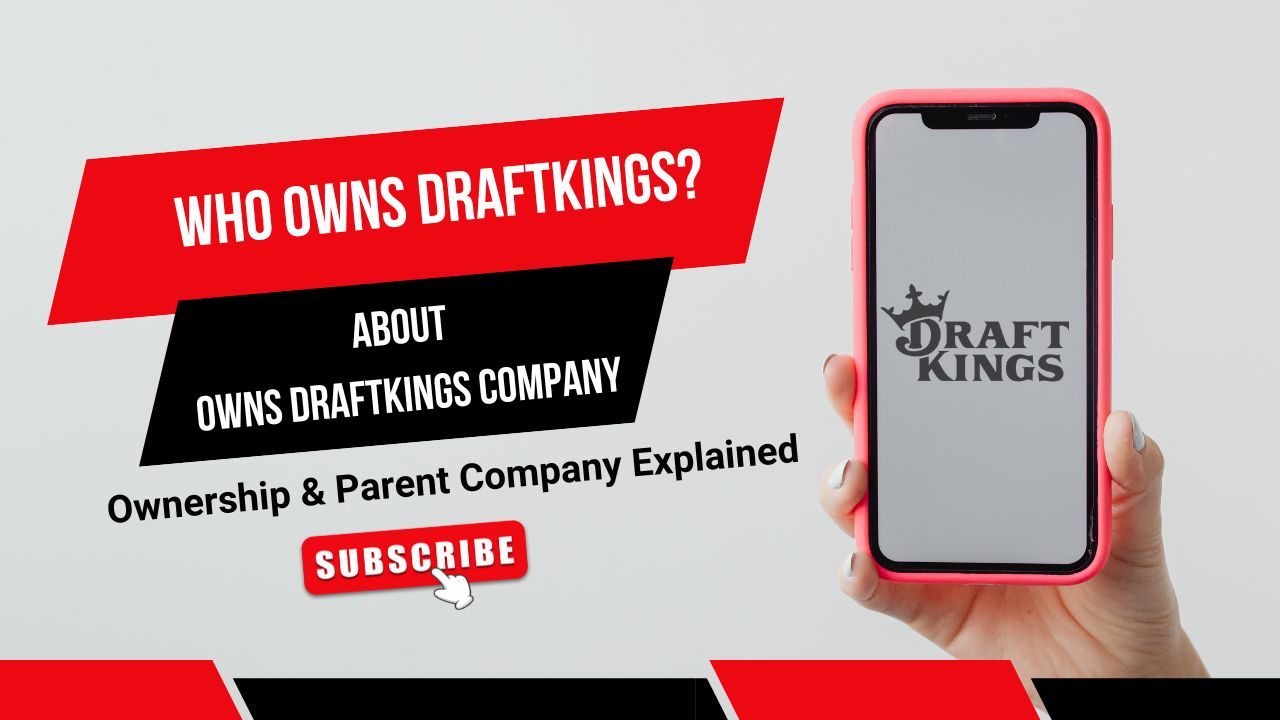Who Owns DraftKings? Ownership & Major Shareholders Explained
Introduction
DraftKings is one of the most recognizable names in the sports betting and daily fantasy sports (DFS) industry, revolutionizing how fans engage with sports.
Founded in 2012, the company started as a daily fantasy sports platform, allowing users to create fantasy teams and compete for cash prizes.
Over the years, DraftKings expanded its offerings to include online sports betting and iGaming, capitalizing on the legalization of sports gambling in the United States.
Today, it operates in multiple states and continues to grow internationally.
With its aggressive marketing campaigns, partnerships with major sports leagues, and innovative betting options, DraftKings has solidified itself as a key player in the multi-billion-dollar sports betting industry.
Understanding who owns DraftKings is essential for investors, sports enthusiasts, and industry analysts.
The company’s financial structure has evolved significantly since its inception, involving venture capital investments, a high-profile SPAC merger, and public trading on the NASDAQ stock exchange.
As a publicly traded company, DraftKings has a complex ownership structure that includes institutional investors, retail shareholders, and company executives.
This article explores DraftKings’ ownership, its parent company status, historical transitions, and the current breakdown of major shareholders.
Who is DraftKings’ Parent Company?
DraftKings does not have a traditional parent company like some other major corporations in the sports betting industry.
Instead, it operates independently as DraftKings Inc., a publicly traded company listed on the NASDAQ stock exchange under the ticker symbol DKNG.
While some companies in the sports betting space are subsidiaries of larger multinational corporations, DraftKings maintains control over its operations and strategic decisions.
This independence allows the company to aggressively pursue growth opportunities, enter new markets, and continuously innovate its product offerings without direct oversight from a larger conglomerate.
Despite not having a parent company, DraftKings has strategic partnerships with various media outlets, sports leagues, and technology providers that contribute to its success.
The company’s 2020 merger with Diamond Eagle Acquisition Corp., a special purpose acquisition company (SPAC), allowed it to go public without the traditional initial public offering (IPO) process.
This merger also included SBTech, a European gaming technology company that provides backend software for sports betting platforms.
This acquisition strengthened DraftKings’ technology infrastructure and enabled it to become a vertically integrated sports betting operator.
DraftKings’ Ownership History
A. Founding and Early Investors
DraftKings was founded in 2012 by three entrepreneurs: Jason Robins, Matthew Kalish, and Paul Liberman.
The company initially launched as a daily fantasy sports (DFS) platform, offering an alternative to traditional season-long fantasy sports competitions.
The idea quickly gained traction, attracting early investments from notable venture capital firms, including Atlas Venture and The Raine Group.
The company also received backing from major sports leagues like Major League Baseball (MLB), which saw potential in the platform’s ability to increase fan engagement.
As DraftKings grew, it raised several rounds of funding from investors eager to capitalize on the emerging DFS market.
By 2015, DraftKings had secured more than $300 million in funding from investors such as Fox Sports, Major League Baseball, the NHL, and Kraft Group (owner of the New England Patriots).
The company’s rapid growth and aggressive marketing campaigns allowed it to become one of the largest DFS platforms in the United States.
However, regulatory challenges in several states posed significant risks, leading DraftKings to explore alternative revenue streams and expansion opportunities.
B. Growth and Expansion
DraftKings’ growth accelerated after the U.S. Supreme Court’s decision in 2018 to repeal the Professional and Amateur Sports Protection Act (PASPA), which had previously restricted sports betting to a few states.
This landmark ruling allowed individual states to legalize and regulate sports betting, presenting a massive opportunity for DraftKings to expand beyond daily fantasy sports.
The company swiftly entered the online sports betting market, launching operations in states that had legalized the industry, including New Jersey, Pennsylvania, and Indiana.
In addition to sports betting, DraftKings expanded into online casino gaming (iGaming) and introduced new betting products to enhance user experience.
The company formed high-profile partnerships with major sports leagues, including the NFL, NBA, MLB, and PGA Tour, further cementing its position as a leader in the industry.
Its aggressive marketing strategy, combined with cutting-edge technology and user-friendly mobile applications, enabled it to capture a significant share of the online betting market.
By 2020, DraftKings was well-positioned for its next major transition—going public.
C. SPAC Merger and Public Listing
Instead of pursuing a traditional initial public offering (IPO), DraftKings opted for a SPAC merger in 2020, joining forces with Diamond Eagle Acquisition Corp., a publicly traded blank-check company.
This move allowed DraftKings to go public without undergoing the lengthy and expensive IPO process.
As part of the merger, DraftKings also acquired SBTech, a European gaming technology firm specializing in sportsbook software and risk management solutions.
This acquisition gave DraftKings greater control over its technology infrastructure, reducing reliance on third-party providers.
The SPAC merger was completed in April 2020, and DraftKings officially debuted on the NASDAQ stock exchange under the ticker symbol DKNG.
The move was met with enthusiasm from investors, as the company quickly gained market traction.
Its stock price surged in the months following the listing, reflecting investor confidence in the rapidly expanding U.S. sports betting market.
Today, DraftKings continues to grow, expanding its reach into new states and international markets while investing heavily in product innovation and user acquisition.
DraftKings’ Shareholder Structure
A. Major Institutional Investors
As a publicly traded company, DraftKings’ shares are held by a mix of institutional investors, retail investors, and company insiders.
Some of the largest institutional investors include well-known asset management firms such as The Vanguard Group, BlackRock, and ARK Invest.
These firms hold significant stakes in DraftKings due to its growth potential and strong presence in the online gaming industry.
Vanguard Group and BlackRock, two of the world’s largest asset managers, each own a substantial percentage of DraftKings’ outstanding shares, making them key stakeholders in the company’s long-term strategy.
Another major institutional investor is ARK Invest, led by Cathie Wood, which has shown strong interest in technology-driven companies with high growth potential.
ARK Invest has actively increased its position in DraftKings, betting on the company’s continued success in the digital sports betting market.
Other hedge funds and pension funds also hold significant positions in DraftKings, further solidifying its standing as an attractive investment in the gaming sector.
B. Key Individual Stakeholders
Among individual shareholders, DraftKings co-founder and CEO Jason Robins remains one of the most significant stakeholders in the company.
His continued leadership and vision have been instrumental in driving DraftKings’ growth, and he maintains a sizeable ownership stake in the company.
Other co-founders, Matthew Kalish and Paul Liberman, also hold shares, though their ownership percentages are smaller than Robins’.
Additionally, several board members and executives hold shares in DraftKings, either through direct purchases or stock-based compensation packages.
These insiders play a critical role in shaping the company’s future and aligning their interests with those of investors.
Given the competitive nature of the sports betting industry, executive stock ownership is often seen as a positive sign, indicating confidence in DraftKings’ long-term prospects.
C. Insider Ownership and Executive Holdings
DraftKings’ leadership team and board members collectively own a notable percentage of the company’s stock.
CEO Jason Robins, in particular, has a strong influence over the company’s direction, and his stock holdings give him significant voting power in key corporate decisions.
The company has also implemented stock-based compensation programs to incentivize executives and employees, aligning their interests with long-term shareholder value.
In recent years, there have been instances of insider buying and selling, which investors closely monitor for insights into management’s confidence in the company.
While some executives have sold shares to capitalize on stock price gains, others have continued to increase their holdings, reflecting their belief in DraftKings’ future.
As the sports betting industry evolves, DraftKings’ shareholder structure will continue to shift, influenced by market dynamics, strategic acquisitions, and regulatory changes.
Conclusion
DraftKings has experienced a remarkable evolution, growing from a small fantasy sports startup into one of the most recognized names in the online sports betting and iGaming industries.
What started as an idea among three co-founders in 2012 has transformed into a publicly traded company with a multi-billion-dollar market valuation.
By leveraging innovative technology, strategic partnerships with major sports leagues, and aggressive expansion into new markets, DraftKings has positioned itself as a dominant player in the rapidly growing sports betting landscape.
Its ability to adapt to changing regulations, capitalize on emerging opportunities, and continually enhance the user experience has been key to its long-term success.
From its early venture capital funding rounds to its landmark SPAC merger in 2020, DraftKings’ ownership structure has changed significantly over the years.
While it does not have a traditional parent company, DraftKings operates independently, guided by its leadership team and influenced by major institutional investors such as Vanguard Group, BlackRock, and ARK Invest.
CEO Jason Robins and other key executives continue to play a crucial role in shaping the company’s vision and strategy.
As the sports betting industry expands and competition intensifies, DraftKings’ shareholder structure will likely evolve, driven by new investments, acquisitions, and strategic initiatives.
The company’s ability to maintain its market position and capitalize on future growth opportunities will be closely watched by investors, regulators, and industry analysts alike.


